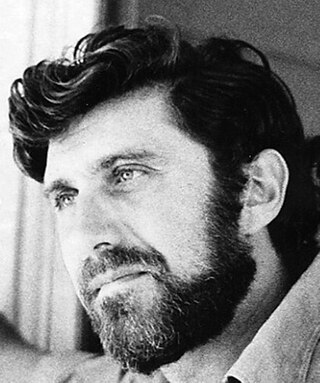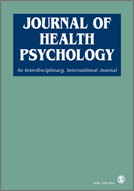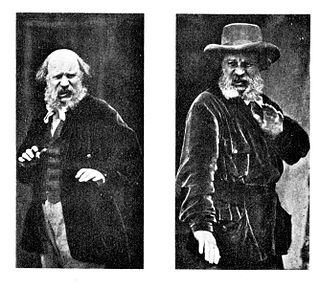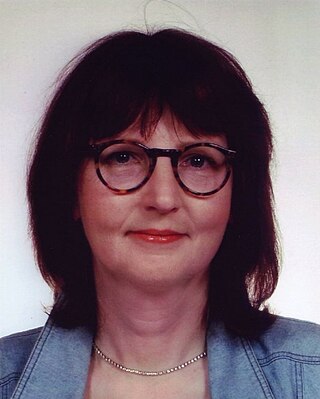Related Research Articles
Déjà vu is the phenomenon of feeling as though one has lived through the present situation before. It is an illusion of memory whereby—despite a strong sense of recollection—the time, place, and context of the "previous" experience are uncertain or impossible. Approximately two-thirds of surveyed populations report experiencing déjà vu at least one time in their lives. The phenomenon manifests occasionally as a symptom of seizure auras, and some researchers have associated chronic/frequent "pathological" déjà vu with neurological or psychiatric illness. Experiencing déjà vu has been correlated with higher socioeconomic status, better educational attainment, and lower ages. People who travel often, frequently watch films, or frequently remember their dreams are also more likely to experience déjà vu than others.

A psychologist is a professional who practices psychology and studies mental states, perceptual, cognitive, emotional, and social processes and behavior. Their work often involves the experimentation, observation, and interpretation of how individuals relate to each other and to their environments.

The Vrije Universiteit Amsterdam is a public research university in Amsterdam, Netherlands, being founded in 1880. The VU Amsterdam is one of two large, publicly funded research universities in the city, the other being the University of Amsterdam (UvA). The literal translation of the Dutch name Vrije Universiteit is "Free University". "Free" refers to independence of the university from both the State and the Dutch Reformed Church. Both within and outside the university, the institution is commonly referred to as "the VU". Although founded as a private institution, the VU has received government funding on a parity basis with public universities since 1970. The university is located on a compact urban campus in the southern Buitenveldert neighbourhood of Amsterdam and adjacent to the modern Zuidas business district.
Forensic psychology is the application of scientific knowledge and methods to assist in answering legal questions that may arise in criminal, civil, contractual, or other judicial proceedings. Forensic psychology includes research on various psychology-law topics, such as: jury selection, reducing systemic racism in criminal law, eyewitness testimony, evaluating competency to stand trial, or assessing military veterans for service-connected disability compensation. The American Psychological Association's Specialty Guidelines for Forensic Psychologists reference several psychology sub-disciplines, such as: social, clinical, experimental, counseling, and neuropsychology.

Elliot Aronson is an American psychologist who has carried out experiments on the theory of cognitive dissonance and invented the Jigsaw Classroom, a cooperative teaching technique that facilitates learning while reducing interethnic hostility and prejudice. In his 1972 social psychology textbook, The Social Animal, he stated Aronson's First Law: "People who do crazy things are not necessarily crazy", thus asserting the importance of situational factors in bizarre behavior. He is the only person in the 120-year history of the American Psychological Association to have won all three of its major awards: for writing, for teaching, and for research. In 2007, he received the William James Award for Lifetime Achievement from the Association for Psychological Science, in which he was cited as the scientist who "fundamentally changed the way we look at everyday life". A Review of General Psychology survey, published in 2002, ranked Aronson as the 78th most cited psychologist of the 20th century. He officially retired in 1994 but continues to teach and write.
Health psychology is the study of psychological and behavioral processes in health, illness, and healthcare. The discipline is concerned with understanding how psychological, behavioral, and cultural factors contribute to physical health and illness. Psychological factors can affect health directly. For example, chronically occurring environmental stressors affecting the hypothalamic–pituitary–adrenal axis, cumulatively, can harm health. Behavioral factors can also affect a person's health. For example, certain behaviors can, over time, harm or enhance health. Health psychologists take a biopsychosocial approach. In other words, health psychologists understand health to be the product not only of biological processes but also of psychological, behavioral, and social processes.

The Journal of Health Psychology is a peer-reviewed academic journal covering all aspects of health psychology. The editors-in-chief are Rachel Annunziato, Abigail Locke, and Gareth Treharne. The founding editor-in-chief was David Marks, who served from 1996 to 2021. The journal publishes reports of empirical studies, critical reviews of the literature, contributions related to theory, open peer commentary articles, and editorials on what are deemed to be significant issues. It was established in 1996 and is published by SAGE Publishing.

Richard S. Lazarus was an American psychologist who began rising to prominence in the 1960s. A Review of General Psychology survey, published in 2002, ranked Lazarus as the 80th most cited psychologist of the 20th century. He was well renowned for his theory of cognitive-mediational theory within emotion.

Disgust is an emotional response of rejection or revulsion to something potentially contagious or something considered offensive, distasteful or unpleasant. In The Expression of the Emotions in Man and Animals, Charles Darwin wrote that disgust is a sensation that refers to something revolting. Disgust is experienced primarily in relation to the sense of taste, and secondarily to anything which causes a similar feeling by sense of smell, touch, or vision. Musically sensitive people may even be disgusted by the cacophony of inharmonious sounds. Research has continually proven a relationship between disgust and anxiety disorders such as arachnophobia, blood-injection-injury type phobias, and contamination fear related obsessive–compulsive disorder.

The behavioral immune system is a phrase coined by the psychological scientist Mark Schaller to refer to a suite of psychological mechanisms that allow individual organisms to detect the potential presence of infectious parasites or pathogens in their immediate environment, and to engage in behaviors that prevent contact with those objects and individuals.

Mark van Vugt is a Dutch evolutionary psychologist who holds a professorship in evolutionary psychology and work and organizational psychology at the VU University Amsterdam. Van Vugt has affiliate positions at the University of Oxford, Institute for Cognitive and Evolutionary Anthropology (ICEA).
Conspicuous conservation describes consumers who purchase environmentally friendly products in order to signal a higher social status.
Evolutionary aesthetics refers to evolutionary psychology theories in which the basic aesthetic preferences of Homo sapiens are argued to have evolved in order to enhance survival and reproductive success.

Frederik Jacobus Johannes Buytendijk was a Dutch anthropologist, biologist and psychologist.
Hendrik (Henk) van der Flier is a Dutch psychologist, and Professor of Work and Organizational Psychology at the Vrije Universiteit Amsterdam and at its Kurt Lewin Institute (KLI), known for his work on comparability of psychological test performances.
Hermanus Johannes "Herman J." Adèr is a Dutch statistician/methodologist and consultant at the Vrije Universiteit, the VU University Medical Center and the University of Stavanger, known for work on Methodological Modelling and Social Research Methodology.

Edith Desiree de Leeuw is a Dutch psychologist, statistician, research methodologist, and professor in survey methodology and survey quality, at the University of Utrecht. She is known for her work in the field of survey research.

Diana Santos Fleischman is an American evolutionary psychologist. Her field of research includes the study of disgust, human sexuality, eugenics, and hormones and behaviour. She is also involved in the natalism, effective altruism, animal welfare, and feminism movements.
Pathogen avoidance refers to the theory that the disgust response, in humans, is an adaptive system that guides behavior to avoid infection caused by parasites such as viruses, bacteria, fungi, protozoa, helminth worms, arthropods and social parasites. Pathogen avoidance is a psychological mechanism associated with the behavioral immune system. Pathogen avoidance has been discussed as one of the three domains of disgust which also include sexual and moral disgust.
Steven Warren Gangestad is an American evolutionary psychologist who is Distinguished Professor Emeritus in the Department of Psychology at the University of New Mexico. With his University of New Mexico colleague Randy Thornhill, he has conducted considerable research pointing to the existence of concealed ovulation in humans.
References
- ↑ "Disgust Evolved To Protect Us From Disease. Is It Working?". Inside Science. Retrieved 2022-12-16.
- ↑ "VU psychologist Joshua Tybur receives ERC Consolidator Grant". Vrije Universiteit Amsterdam. Retrieved 2022-12-16.
- ↑ Gorman, James (2012-01-23). "Survival's Ick Factor". The New York Times. ISSN 0362-4331 . Retrieved 2022-12-16.